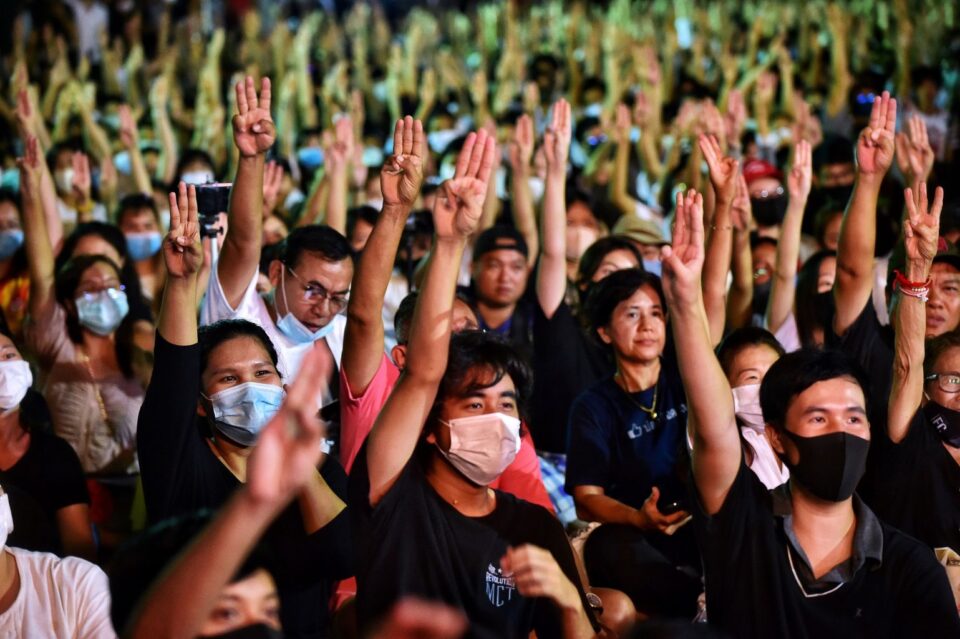Thai politics is notorious for its twists and turns, a rollercoaster of power plays that leaves voters constantly giddy and sometimes sickened. 2022 will be no different, with a host of crucial events and turning points that will shape the country’s future. Can the Prayut-led government survive its third year and remain until its term ends in 2023? Who will win Bangkok’s top job in the first gubernatorial election to be held in almost 10 years?
Thai PBS World’s Political Desk examines five political highlights to look out for in the year ahead.
Prayut’s tenure dispute
Controversy over Prime Minister Prayut Chan-o-cha’s term is a crucial issue this year, as it affects not just him but also his government.
Prayut has been prime minister since August 2014, taking over a few months after leading a military coup that ousted an elected government in May that year.
Now, nearing almost eight years in office, a legal question has arisen over Prayut’s position. The 2017 Constitution stipulates that “the prime minister shall not hold office for more than eight years in total, whether or not consecutively”.
Legal experts are divided over how this deadline should be interpreted.
Some reckon the eight-year period runs from when the current charter was enacted on April 6, 2018. Others, including some lawmakers, are convinced that Prayut’s term expires in August, when he will have served eight years since taking the helm in 2014.
Opposition politicians are planning to take the dispute to the Constitutional Court.
Observers say regardless of what the court decides, the ruling will have huge implications.
First, it will create a crucial precedent since no previous Thai charter has set a time limit for the PM’s tenure, said Yuthaporn Issarachai, a political scientist at Sukhothai Thammathirat Open University.
Second, it is expected to spark a power struggle in Parliament, he added. If the court rules that Prayut’s tenure expires this August, then Parliament will have to choose a new prime minister from the existing list of PM candidates.
Prayut is the sole candidate of the ruling Palang Pracharath Party, and if lawmakers can’t choose him, they will have to opt for candidates from other coalition partners and the opposition camp.
The other candidates include former Pheu Thai executive Khunying Sudarat Keyuraphan, founder of the new Thai Sang Thai Party, former premier Abhisit Vejjajiva from the coalition Democrat Party, and Anutin Charnvirakul of Bhumjaithai.
Palang Pracharath could only hang on to the premier’s seat by winning a two-thirds majority (500 votes) from both houses of Parliament to run a non-listed candidate or outsider.
The court will also decide Prayut’s political future, as it will rule whether he can return as PM in the next poll or be ousted from politics altogether, said Yuthaporn.
House dissolution and general election?
The current government’s term ends in March 2023, but the premier can dissolve the House this year and call a snap election.
Yuthaporn is convinced that pressure from coalition partners over COVID-19 and the resulting economic crisis will see Prayut leave office before March 2023.
Authorities recently stepped up measures to combat the spread of ultra-transmissible Omicron variant.
However, not all political experts see signs of an early election.
Stithorn Thananithichot reckons the government will see out its full term with ease.
“I see no [significant] pressure from outside, either from anti-establishment protesters, from opposition parties or from within the party or coalition partners,” said the director of the Office of Innovation for Democracy at King Prajadhipok’s Institute.
“The protests are losing momentum, while the coalition is happy being part of the government,” he added.
Governments usually time their dissolution of the House to exploit an upturn in the polls but there is no evidence this will occur.
“It will only be possible for Prayut to call for House dissolution if the government wins a surge in popularity by successfully handling the pandemic, reopening the country and reviving the economy,” the analyst said.
“But I see no signs of this happening. I don’t see the government becoming popular again or coalition partners willing to go to the polls just yet. I see no good time for the premier to do that [dissolve the House].”
Bangkok governor election
By mid-2022, Bangkokians should have cast their ballots at the first gubernatorial elections in nine years.
Serving as an indicator for the general election, the Bangkok poll sparks fierce battles among major parties as they seek to woo voters. This time, both government and opposition parties have set their sights on the governor’s post.
Several strong candidates have thrown their hats into the ring, including former transport minister Chadchart Sittipunt, who is topping most opinion surveys. Also joining the fray are academic Suchatvee Suwansawat from the Democrat Party and former senator Rosana Tositrakul.
However, a surprise could lie in store as Bangkokians are notorious for being independent-minded and unpredictable swing-voters.
Censure debate
The opposition parties are expected to hit the government with a no-confidence motion in May. Don’t rule out the possibility of another plot to unseat the PM, following the one he managed to survive last year.
Last September’s censure debate saw ruling party secretary-general Thammanat Prompow reportedly engineer a plot to oust Prayut by amassing no-confidence votes against him.
This ruling party power struggle is expected to simmer on if the conflict between the PM and Thammanat remains unsolved, continuing to threaten Prayut’s premiership.
Changes to parties’ landscape
As we count down to a general election, 2022 will see political parties – large, small and newcomers – busily preparing for the polls.
A new organic bill to change the one-ballot voting system to a two-ballot system will benefit big parties and spur different electoral strategies.
“We will see a ‘homecoming’ of former Pheu Thai MPs [who defected previously], including key party executives like Khunying Sudarat,” Stithorn predicted.
Pheu Thai, now the main opposition party, came to power in 2011 under the two-ballot system.
The new system will favor big parties like Pheu Thai and Palang Pracharath, while medium-sized and smaller parties like Future Forward’s incarnation Move Forward will pick up fewer votes, Stithorn said.
By Thai PBS World’s Political Desk




